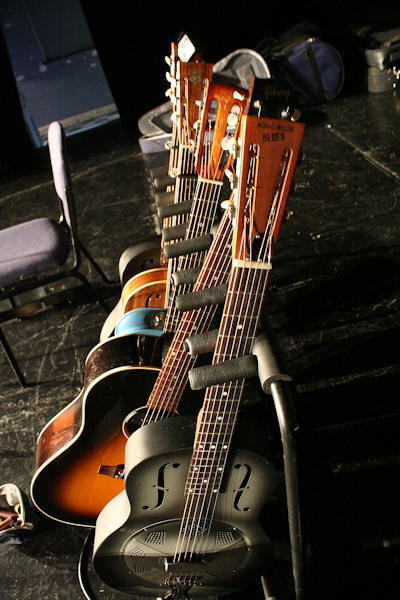
Painting © 2004 Loz
Arkle
Website
© Copyright 2000-2011 Alan White - All
Rights Reserved
Site optimised for Microsoft Internet Explorer



Early Blues Interview |
|
Michael Messer recently toured the UK with Louisiana Red - "A collaboration of two great musicians from totally different backgrounds, brought together through a passion for playing blues slide guitar and many years of mutual admiration for each othersí work". I had the privilege of interviewing Michael on tour at Bury Met Arts Centre.
Alan: What are your first musical memories? Michael: I was born in 1956 and my Mum was a RockíníRoll fan so my very earliest memories are things like Heartbreak Hotel on the wind-up gramophone and I remember thinking, ďWowĒ. But I got more serious about music with the Rolling Stones, Beatles and the whole sixties thing. I started buying records when I was seven years old! Alan: Did you always want to become a musician? Michael: Yes, but I didnít know anything about the world of musicians or how it worked. To me, it was just something I saw on TV and heard on the radio. I had no idea or any connection whatsoever to anyone in that world. I always played music and I played throughout my teens in bands. I started playing guitar and banjo as a young child and then double bass when I was about thirteen and then went back to guitar and experimented with various other instruments. Alan: So what kind of material were you playing in the early days? Michael: As a teenagerÖRock - Led Zeppelin, Grand Funk Railroad, Deep Purple, Who, Elvis Presley and a lot of blues and rock and roll things. I started getting very serious about blues in the early seventies and about roots music generally, but especially blues. Louisiana Red Sings the Blues was one of the first blues slide guitar records I ever bought, along with Muddy Waters and various other things at the time, when I was about sixteen or seventeen. One of my oldest friends is Chas Jankel, who co-wrote and produced most of the Ian Dury and the Blockheads music and in the late 70s I was around a lot of the stuff that happened on Stiff Records. I was probably the first person outside of the band to hear the classic Hit Me With Your Rhythm Stick. Being around Chaz and the Blockheads was very influential and was one of the things that inspired me to become a professional musician. I understood these people, they way they worked and how they thought. These people, musicians, are my tribe and that was part of what inspired me to want to do it.
Alan: Tell me about your early years playing with Ed Genis and Mike Cooper Michael: I met Mike Cooper in 1983. Iíd taken a job in the Arts Centre in Bracknell because they were musically oriented. They had a weekly R & B club, Charlie Watts & Rocket 88 played there regularly, and they ran three major music festivals. I also had heard that Mike Cooper played there. Very soon after starting work at the arts centre I met Mike and we started playing together. There were very few people playing acoustic delta blues back then. It was through going out to gigs with Mike that I started getting known in the world of roots, blues and folk music. I cut a record with Mike Cooper and Ian Anderson in 1984, The Continuous Preaching Blues. That was my first recording experience and led to me getting noticed in the press for my slide guitar playing. At that point Iíd already met Ed Genis and we were playing regularly, not gigs, it was just social. Around that time I decided I wanted to make a record and to see if I could get a recording deal. I paid for a studio, made a record 'Diving Duck', got a deal and it launched me into the world of being a recording artist. Diving Duck was quite successful and was my breakthrough that got me noticed.
Michael: There have been many influences. Much as I love and have spent most of my life playing Delta & Chicago blues, I also love well-produced pop music. Thatís one of the things I love about Chess Records Ė they are great recordings, great pop records. Hoochie Coochie Man is a fantastic pop record, itís not just a blues record and that area has always fascinated me. Itís really difficult to pinpoint influences. Iíve got a lot from different areas. Within acoustic blues; the old masters, the obvious people like Robert Johnson, Fred McDowell, Willie McTell. In contemporary music, all kinds of music Ė the Rolling Stones and the Beatles were a big influence. Lots of bands and artists that use roots music as their source; Humble Pie, Rod StewartÖetc. I used to not answer these questions honestly because I used to think it wasnít cool Ė but Iíve got every Elton John record up to Captain Fantastic & the Brown Dirt Cowboy. I canít listen to anything he recorded after Captain Fantastic, but those early records are very good. I respect those artists as much as I respect Elmore James and Muddy Waters. World Music tooÖÖ I went nuts on that in the early eighties, especially with the African stuff. King Sunny Adť, Fela Kuti, Ali Farka Towre, S.E.RogieÖ. Iím also led in some ways by my instrument. So anything thatís got slide guitar or pedal steel guitar or anything slide related has led me to discover lots of music. Alan: Of all the albums youíve released, what are your favourites? Michael: Well, each one at the time of its release is the very best thing youíve ever done. But looking back....thatís a difficult question because each one is like a photo album of the time. But I think I probably broke more ground with Slidedance, Moonbeat and Second Mind than I broke with anything else. Those three albums were quite ground-breaking and different, and pushed the boundaries of what people were doing with blues music. Slidedance was pushing world music and blues together, Second Mind was pushing all kinds of other influences and featured Louie Genis on the turntables scratching with old blues records. Moonbeat, in many ways is everything I have done in one record. The first time we used the turntables was in 1995 on Moonbeat when nobody but nobody was using them in blues and I think we were the first to do it. Second Mind in 2002 came about in a strange way and is very relevant as I am currently touring with Louisiana Red. Red and I were going to make a record for Catfish Records and three weeks before we were due to go into the studio when everything was booked and paid for, the project fell apart. The record company was panicking saying ďWhat are we going to doĒ so I said ďIíll make a record for youĒ. They said, ďItís in eighteen days, have you got the material?Ē and I said, ďWell, no, but I will haveĒ and that how Second Mind came about.
Alan: Are there any particular songs you play that have special meaning to you? Michael: Every song has really, otherwise I donít do them. Much of the material on my albums has been written with Terry Clarke who is an old friend and a great songwriter. I can write and I do write but I prefer to bring ideas to the table and work with someone whoís really focused and experienced at writing. I also like the fact that he has other influences, so I might play him a groove and Iíll say, ďLook, Iíve got this idea. Itís about this bloke called Alan White and Iím tuning a guitar in the dressing room, but I donít quite know where it goesĒ and heíll say, ďAhh, I know a great song by Dion Dimucci (Dion & the Belmonts) and thatís a bit similar...Ē so I really like that his influences come from so many other areas. To pastiche old blues songs the way some people do just doesnít work for me. Alan: What is your favourite type of guitar? Michael: Vintage Nationals and my own MM brand!!! Alan: How healthy do you think the blues scene is in Europe compared with the US? Michael: I think itís probably healthier here as an industry, but thereís more of it being played in the States. So in the US there are less people making a living out of it, but more people playing it. If itís wasnít for Europe, the blues would never have become a world music. Alan: Do you think in America, they play the blues that people expect to hear? Michael: Yes, itís much more generic. If you come from Texas, you play Texas blues, because thatís what you do. I think British musicians have always had an interesting take on playing American music and it is still happening today. Alan: Tell me more about the launch of your own brand of guitars
Alan: Some music styles may be fads but the blues is always with us. Why do you think this is? Michael: Are they fads, or are they still going in small pockets? They may not be a part of popular culture any more, but they are still going. The blues is very much a world music these days and itís played everywhere. As a musical form it is relatively easy to get on, although whether you do it well is another matter. But itís not difficult to get yourself going. One, two, or three chords and a few licks and if youíve got a bit of musicality you can get something happening. Which is the same in most folk music styles, but the blues has definitely got something that we can all relate to. It is played and understood in almost every country in the world. Alan: How do you see the future of blues music? Michael: Itís really interesting how it moves forward in some areas but doesnít move at all in other areas. Thereís a certain place it canít go because it is limited. For example; slide guitar in country music & western swing music started to need more harmony and more than you can get from six strings. So the pedal steel guitar evolved to cope with that and its capabilities are limitless. Slide guitar on a pedal-steel is very different to Blind Willie Johnson & Robert Johnson, but slide guitar by a modern blues players such as Derek Trucks or Sonny Landreth is not that far from it, so as an instrument in the blues, slide guitar hasnít moved forward that much in nearly a hundred years. Musically, blues has been through many changes and has evolved in different directionsÖ.it has been electrified, rocked up, jazzed up, speeded up, computer generated, sampledÖ.etcÖ.and so it should! What I donít like to see is when young players try to play like the greats of the baby boom. I want to see them playing blues, but mixing it up with what they are growing up with. Thatís what I do. Itís what Robert Johnson did and what The Rolling Stones did. I do think the future of blues is pretty healthy and it will always return to the surface in some form. Seasick Steve is currently doing the whole thing a big favour and introducing young people to rough-edged delta blues and slide guitar playing. He has got teenagers in 2009 talking about Mississippi Fred McDowell and searching out his music. When somebody becomes an international star playing a certain type of folk music, it does push it to the fore. The same thing happened with the film O Brother Where Art Thou and old timey country music. Alan: What are your future plans. Albums, gigs? Michael: Oh yes! All of the above! Alan: Thank you very much Michael: It's a pleasure. Alan White - earlyblues.com www.michaelmesser.co.uk
Return to Blues Interviews List
Website, Photos & Text © Copyright 2000-2009 Alan
White. All Rights Reserved. |





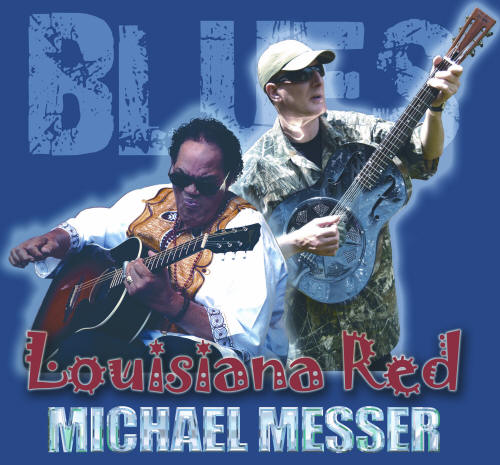
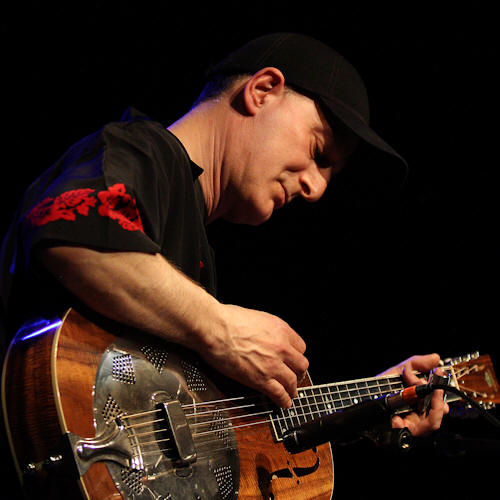
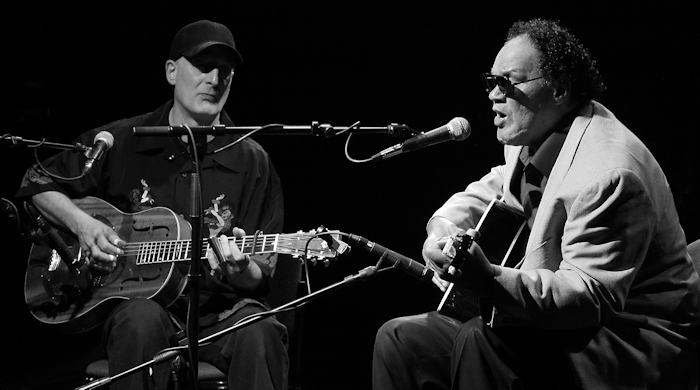
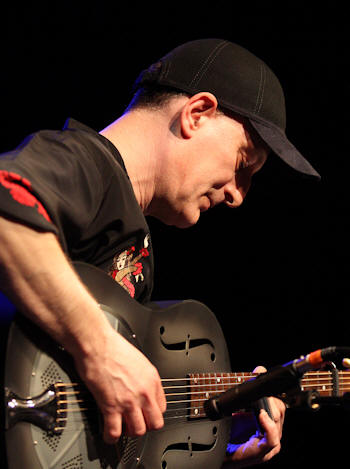 A
A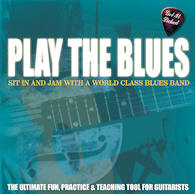
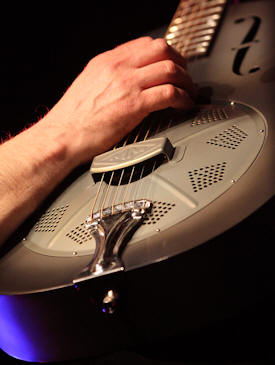 Michael:
Michael:
